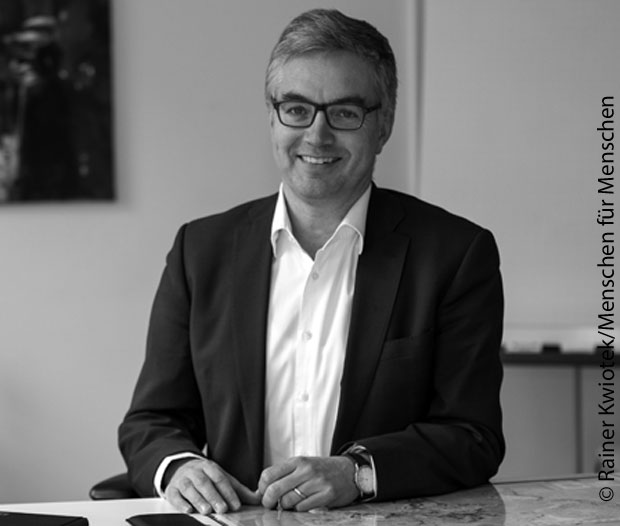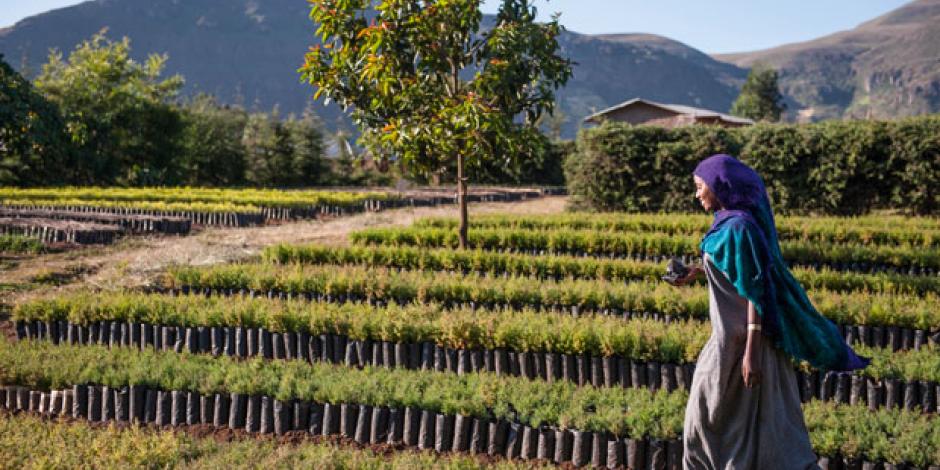Interview: Ian McMaster
Has the increased awareness of environmental matters also raised awareness of the importance of your organization’s development work in Ethiopia?
Absolutely. For example, because of our track recordErfolgsbilanztrack record, we are now suddenly being bombarded with requests to plant trees because people want to to offset sth.etw. ausgleichenoffset their CO2 emissions. More generally, people understand the connection between development and environmental changes. The planet doesn’t really care whether it’s got humans on it — it would survive without us — but human beings do need the environment. So, if we say we want to focus on helping human beings, it’s essential that we make sure the environment is working well. In Ethiopia, the population increased from 35 million to around 110 million in the last 40 years. And 75 per cent of the people still live in farming households. To survive, they have had to cut trees to build housing, for firewood, to have more land to farm and for their animals to to grazeweidengraze on. Both the microclimate as well as the global climate have therefore dramatically worsened over the last 50 years. To create a sustainable environment for humans, we therefore to reforest sth.etw. wiederaufforstenreforest the areas. We also stop the erosion caused by deforestationAbholzung, Rodungdeforestation — for example by closing erosion gully(Wasser-)Rinnegullies with dam(Stau-)Dammdams. We need to reduce the use of wood, for example by providing efficient stoveHerdstoves so that people use 80 per cent less wood — again, to avoid deforestation. So, to make the lives of the farmers and their families sustainable, we need to invest massively in environmental and resource protection, which is what we have done, planting more than 250 million trees in the past almost 40 years. The key to success is to make it a joint activity with the community. The problems will only be solved if their participation is high and ownershipEigentum(srecht), Besitzownership is taken by the local community on all levels.
Dr Sebatian Brandis has been the executive director and spokesman of the board for the Menschen für Menschen — Karlheinz Böhms Äthiopienhilfe — foundationStiftungfoundation since December 2016, with responsibility for communication, fundraisingMittelbeschaffungfundraising, finance and administration. He has worked extensively in the private sector, for example with VIAG INTERKOM and Booz Allen & Hamilton. He also held management positions in the BT Group.

What lessons can NGOs and the private sector learn from each other?
I think NGOs can learn a bit more about efficiency and how to structure things. The private sector, on the other hand, could learn more about how to focus on people, rather than on making as much money as possible. The problem with the private sector is that it focuses on customers — everyone is proud to be “customer-centric”. But a “customer” is a reduction of a human being to an entityObjektentity that is valued mainly for its ability to pay money, whereas an NGO focuses on human beings and their dignityWürdedignity holisticallyganzheitlichholistically.
What is your organization’s biggest challenge at the moment?
To manage the transformation to new business models. Fundamentally, I believe the one-time donationSpendedonation model works, but it should not be our only source of money. In an increasingly volatileschwankungsanfälligvolatile media environment, tomorrow, the main new focus on urgent needs globally might be on another country. And, suddenly, large parts of the donation money go elsewhere. And how do we still meet the continuing demand in Ethiopia then? We’ve got long-term commitmentVerpflichtungcommitments in our partnership with the people in Ethiopia. We commit to our integrated projects for 10 to 15 years before we leave. So, how can we make sure that the inflowZuflussinflow of money supports that kind of long-term strategy? We need different business models so that our income is steadyregelmäßig, konstantsteadier. And we need to do this in partnership with others. None of the players — the state, the private sector, NGOs — will solve the problems alone. Every partner has its specific strengths and weaknesses. So, I think the challenge is to create cross-sector partnerships to bring together the best competencies of each partner. We need the money from the private sector. We need the expertiseSachkompetenzexpertise of NGOs and their connection to human beings. And we need governments to create regulations that are sustainablenachhaltigsustainable in the long term and to to implement sth.etw. umsetzenimplement best practices on a large scale.



